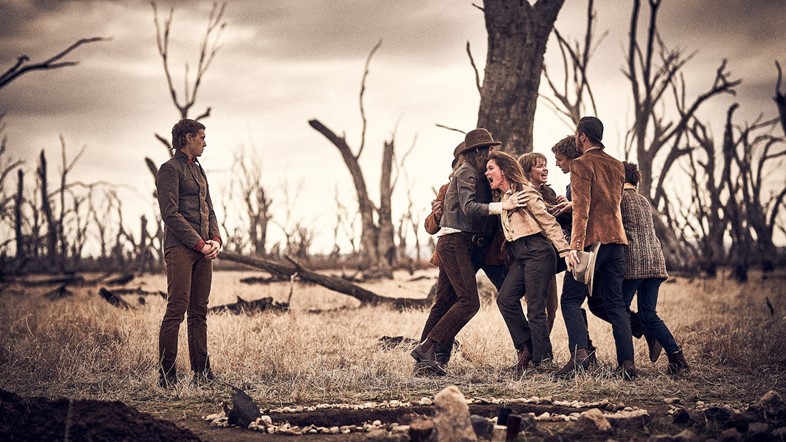Director Justin Kurzel discusses his latest film, True History of the Kelly Gang, and how Ned Kelly relates to ideas of Australian male identity
- TextThomas Curry
“Narratives and truth can be easily turned into anything you want them to be,” says director Justin Kurzel. “It’s all only a point of view.” We’re talking about Kurzel’s latest film, True History of the Kelly Gang, a stark, sublime and feverish adaptation of Peter Carey’s Man Booker-winning novel of the same name. The ‘truth’ of Kurzel and Carey’s story is ambiguous – this is not a historically accurate biography, though it does contain fragments of fact – but, says Kurzel, that’s the whole point. “The truth gets turned into whatever suits someone’s thoughts, and ideas, and agenda,” he says. True History of the Kelly Gang is a story about fact, fiction and how the meaning of truth is defined by the storyteller.
Initially hesitant to add another Ned Kelly film to an ever-growing list of biopics – the bushranger has been played by everyone from Mick Jagger to Heath Ledger over the years; Kurzel’s version stars a magnetic performance from George MacKay – it was Australia’s obsession with the outlaw itself which ultimately piqued the director’s interest. “What’s astonishing about Ned, he’s a tattoo on a man’s back,” Kurzel says, “he’s a beer coaster, he’s a keyring, he’s a person that 11 films have been made about. There’s a desperate ownership of who he is.” Rather than the heroic adventure of a swashbuckling rogue, True History of the Kelly Gang turns inward to examine how Ned’s story gets used as shorthand to express what it means to be an Australian. “He’s become a bit of a carnival,” says the director. “He’s used in different ways to identify who we are. The film speaks to that theme in a very intimate way.”

Setting Kurzel and Carey’s story apart, True History of the Kelly Gang follows Ned from his childhood up until his death in his early twenties. It offers a factually inspired, but fictional account of the incidents, motivations and moments that shape Ned into the man behind the myth. Of particular focus throughout the film is Ned’s volatile, tender relationship with his mother. This bond, and the lengths Ned will go to, to reconcile their relationship propel the story forward with a foreboding and gripping urgency. “Not many people know much about the relationship with his mother,” says Kurzel, “it was pivotal in shaping him. Our focus on that aspect of Ned’s life is quite unique to this film.” That this story, in turn, is nested, almost gothically, in a letter Ned writes to his daughter. “My dear child,” reads Ned’s narration, “I write to you now so you do not grow to confuse fiction for fact, and view your father in an unsavoury light.” It further heightens the importance of family, legacy and reputation in Kurzel’s adaptation.
As Ned ages throughout the film, he gradually begins to form his own value system, a code of ethics that challenges the stated law and order of the day. His actions blur the line between right and wrong. “It was a harsh land,” says Kurzel, “what was good and what bad, what was corrupt and what people could get away with is very different.” As well as morality and hierarchy, Ned awkwardly, adolescently also pushes back against received ideas about masculinity and what makes a man. “The film chips away at the expectation of what an Australian male is and what Ned should have been,” say Kurzel. “When I was growing up there was a certain way you were expected to behave – join the football team, be durable, keep your problems to yourself. That’s been pushed on a lot of us.” One by one the film presents, then discards a handful of different male role models for Ned. “It’s hard to live up to the expectation of what an Australian male is, it’s not healthy,” says the director. “There’s a mythology about Ned as a particular type of Australian male and we were definitely questioning that. There’s a provocation in the way we present these men on screen.”
Ultimately, for Kurzel, these ideas – myth-making, masculinity, family, morality, history – are all reflected at various points through Ned’s story. Through his interpretation of Ned’s biography, True History of the Kelly Gang evolves from a nuanced character portrait into a thoughtful re-evaluation of Australia’s national identity. “Times are very complex in Australia at the moment,” he says. “There’s a huge part of our history we have enormous guilt and shame about. By making this film, by interrogating how we define ourselves in the image of this 24-year-old man, I’ve questioned what Ned’s story says about us. Why are we so hung up on him? Why can’t we look beyond his story? Peter’s book and this film challenge our need for a narrative about who we are that’s inspired by him.”
True History of the Kelly Gang releases at Picturehouse Cinemas and select theatres nationwide from February 28, 2020.











